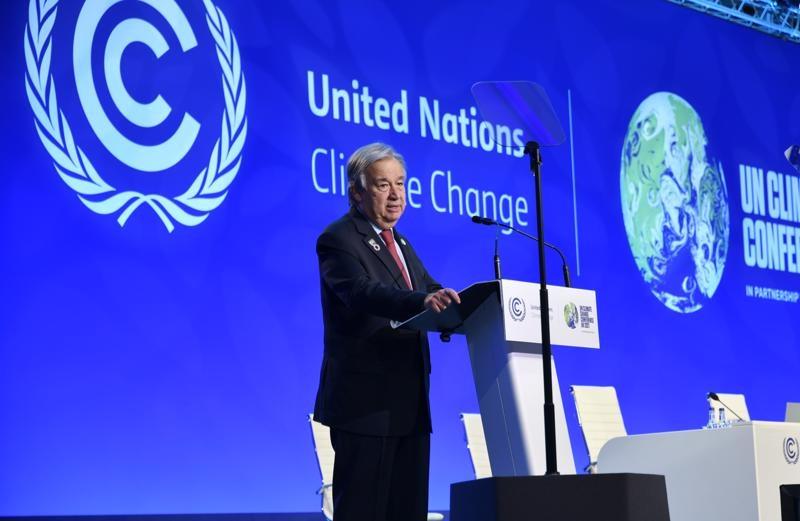
Reflections on COP26
by Dr Nigel Jollands 28 Oct 2022 08:28 UTC

UN Secretary-General António Guterres at COP26 © Dr Nigel Jollands
Ahead of the upcoming COP27, OCC Member and climate scientist, Dr Nigel Jollands reflects on what came out of COP26, the UN Climate Conference in 2021, and what must happen next.
An unseasonably warm wind tears across Novara's decks. The autumn gales have arrived in the English Channel, but I'm not the only sailor confused by temperatures still in their late teens. 'The weather's not what it used to be', says an old sea dog neighbour in the marina. 'It's climate change!' he says. It seems that climate change is on everyone's minds. After working in the climate change field for the last 30 years, it's not the first time that I reflect on my work, my time at COP26 in Glasgow last year, and wonder what will COP27 bring?
First, let's reflect on COP26. Under a dreary Glaswegian sky, representatives from nearly 200 countries gathered in October 2021 with four aims:
- The expansion of greenhouse gas (GHG) emission reduction targets;
- Financing the energy transition of the poorest countries;
- The reduction of methane emissions;
- The organisation of the carbon market.
What we got was the Glasgow Climate Pact that made 6 key pronouncements. First, it repeated the usual refrain recognising with alarm that human activities have caused warming of around 1.1 degreesC to date, that impacts are already being felt, and that the window for climate action is small and shrinking.
Second, and perhaps most concerning, is that the Pact noted that the sum of all current climate action plans submitted by governments (so-called 'nationally determined contributions' or NDCs) fall well short of what is needed. The science tells us that reaching 1.5 degreesC requires a decrease in global CO2 emissions of 45% by 2030, compared to 2010 levels, and to net zero by 2050. What current plans would deliver is a 13.7% increase above 2010 levels in 2030.
Third, the Pact explicitly mentions fossil fuels for the first time and commits to a "phasedown" (changed from "phase-out" at the last minute following pressure from India and China) of unabated coal power and a phase-out of "inefficient" fossil fuel subsidies.
Fourth, it noted "with deep regret" the failure of the developed countries to mobilise USD 100 billion of climate finance annually for developing countries from 2020.
Fifth, it focused on the critical role of adaptation and adaptation finance, including an ambition to double the developed countries' provision of adaptation finance from 2019 levels by 2025.
Finally, the Pact celebrates, and for good reason, the agreement reached on the Paris Rulebook, which includes agreement on
- the mechanisms covering voluntary cooperation, a new carbon crediting mechanism, and non-market approaches;
- common timeframes for NDCs and
- finalisation of the Enhanced Transparency Framework that agrees on how to track and communicate progress on Paris Agreement implementation.
Ultimately, though COP26 fell well short of its main goal - delivering the national commitments that would together limit warming globally to 1.5C. So, where does that leave us? It means that COP27 will need to deliver the huge ambition that the world has been waiting for. Let's see if it can deliver this herculean ask and I'll report back when I return from Sharm El Sheikh COP27 in late November.
In the meantime, when I'm not out sailing on board Novara, I'm working with like-minded people on the Novara One Planet project. In this project, we're focused on helping communities prepare for climate change - helping them to develop their own climate adaptation plans. If you'd like to find out more, visit www.novara.world.
This article has been provided by the courtesy of Ocean Cruising Club.